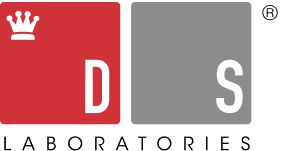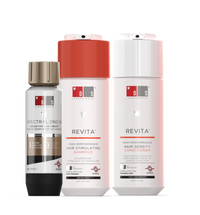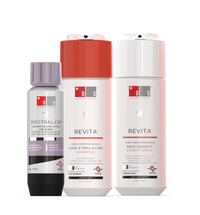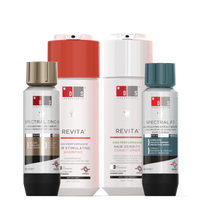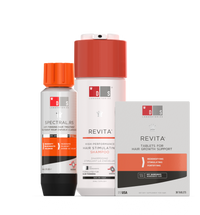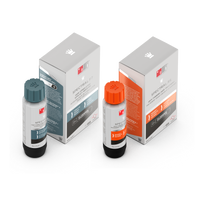Pregnancy, childbirth, and nurturing a new baby is no easy feat. It takes a lot of energy and nutrients to grow a baby, and it can take a toll on a new mother’s body. From changes to your muscles and bones to postpartum hair loss, mother’s go through numerous changes that make their bodies able to carry a child. While many of the more challenging physical changes are out of your control, you can be proactive in helping regrow postpartum hair loss and restoring your hair to incredible health.
How To Regrow Postpartum Hair Loss
Translation missing: en.blogs.article.author_on_date_html
What Causes Postpartum Hair Loss?
When you are healthy, free of excess stress, and you are not experiencing hormonal fluctuations, hair growth follows a normal cycle:
- Anagen (Growth Phase)
- Catagen (Transition Phase)
- Telogen (Resting Phase)
If you undergo physical changes or even emotional trauma, it can trigger a condition called telogen effluvium. In this condition, people can lose around 300 hairs per day. Women who have recently had a baby commonly have telogen effluvium because of rapid changes in hormone levels. Most women notice postpartum hair loss about three months after birth, but women can get telogen effluvium anywhere between 2 and 6 months after having their baby.
During pregnancy, women have high levels of estrogen and progesterone. These hormones must remain elevated to keep the pregnancy healthy. Many women enjoy certain physical benefits, including the “pregnancy glow” and thicker hair. High hormone levels impact the normal hair growth cycle by keeping hair follicles in the growing phase throughout the pregnancy. Once your baby is born, estrogen and progesterone fall to lower levels as high levels are no longer needed, and other hormones need to be signaled to turn on (such as prolactin - the hormone that stimulates milk production).
When estrogen levels fall after childbirth, hair follicles that were sustained in the anagen phase move into the catagen phase. Catagen is just a short transition phase that lasts about two weeks, and then your hair moves into telogen. Hair “rests” for around 100 days or approximately 3 months. At the end of three months, hair follicles shed because they are no longer receiving the oxygen and nutrients they need to continue growing.
In a healthy hair growth cycle, people lose between 50 and 100 hairs every day. Therefore, when women have postpartum hair loss or telogen effluvium, losing 300 strands or more each day can be quite disturbing, especially when you haven’t lost much hair during 40 weeks of pregnancy.
How to Regrow Postpartum Hair Loss and Restore Hair Health
When you think about the effort it takes to grow and birth a child--the sleepless nights, the feeding, emotions, and overall effort it takes to get a tiny human started in life; it’s no wonder that your hair suffers for a short period of time. Indeed, when it comes to keeping the rest of our body systems going, hair seems pretty insignificant in the grander scheme of what our body does every day, especially for postpartum moms. But hair is so important to our expression of self and even our self-confidence. So it is no wonder that new moms can feel frustrated and insecure about postpartum hair loss.
While postpartum hair loss is normal and expected, it doesn’t make it any easier, particularly if your hair became thick and full during pregnancy. Fortunately, there are some useful tips on how to regrow postpartum hair loss.
- Continue your prenatal vitamins - This can benefit both you and your baby if you are nursing. Breastmilk contains an incredible amount of vital nutrients provided by your body and your diet. To ensure you get enough nutrients while breastfeeding, continue taking prenatal vitamins because they are full of important nutrients that can benefit your hair as well as your baby and your body.
- Eat a healthy diet - A proper diet is an essential foundation for having healthy hair on your head. If you do not eat enough of the right nutrients, your body will not be able to allocate essential nutrients for hair regrowth. Eating as a new mom can be especially challenging, but make sure you eat regularly and get enough protein, vitamins, iron, and zinc in your diet as well.
- Reduce stress - As a new mom, we know this is hard. Learning how to care for a new baby can be one of the most stressful, albeit joyful, times in your life. Unfortunately, hair loss is common in people who have a lot of stress. Indeed, stress can even cause telogen effluvium. Find ways to get as much sleep as you can and ask for help with managing it all to improve your overall health (and sanity).
- Minimize damaging styles - Harsh styling treatments such as perms, dying your hair, or frequent use of hot styling tools can further damage hair follicles. In postpartum hair loss, your hair has already switched to a dormant stage after childbirth, so you will lose those hairs whether you dye your hair or not. However, it is important to keep hairs that are in the anagen phase healthy when your new hair follicles start growing.
- Products matter - What you wash your hair with is crucial as your hair, and your skin, absorb the products we use. Postpartum breastfeeding mothers must be especially careful of the products they use to ensure their babies do not ingest any harmful substances absorbed through their system.
If you are concerned about your postpartum hair loss and feel that you are losing too much hair, speak with your doctor. A visit with your provider can help you make sure that your hair loss is from normal hormonal changes from childbirth and is not caused by a medical condition such as postpartum thyroiditis. Some women may request to have blood tests to make sure they are not deficient in any essential nutrients and minerals.
For moms who are looking for products to help regrow postpartum hair loss, DS Laboratories offers safe and effective products for postpartum women. Our Revita shampoo and conditioner contain the most effective and safe ingredients for postpartum hair regrowth. Postpartum women can also take DS Laboratories Revita tablets for hair growth support. These tablets are 100% drug-free and are filled with important ingredients for your hair and your body including magnesium, zinc, iron, melatonin, biotin, and vitamin D. Finally, the Spectral.RS Anti-Thinning Hair Treatment is perfect for women who are suffering from hormonal hair loss. This drug-free product uses cutting-edge technology to deliver ingredients that actually work to regrow hair without harming you or your nursing baby.
If you want to tackle your postpartum hair loss and restore your hair to even better health than before pregnancy, you can combine all of the powerful ingredients for hair regrowth in the DS Laboratories Postpartum Hair Loss Kit.

